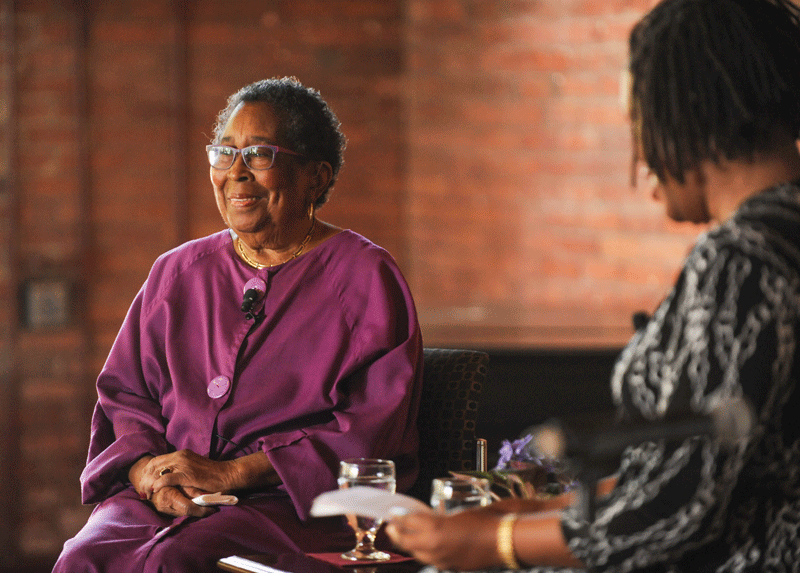Pioneering Activism: A Conversation with Dr. June Jackson Christmas '45-4, an excerpt

I grew up in Cambridge, Massachusetts, the older of two girls in our modest family. We were modest in income, middle class in values. My father worked in the post office during the Depression, so we didn’t have to worry because he always had a job when other people were having their problems. But our aspirations were always that my sister and I would go to college.…
Now, in Cambridge, MA, as in Boston, there weren’t that many black people. So the church we went to—the Episcopal church near us—was predominantly white with about six black families out of two or three hundred. One of the girls in that church went to Vassar. She came home and said to her parents, “Vassar is going to admit Negroes.” This was about 1939, and the way it happened was that a wonderful minister, James Robinson, a Presbyterian minister from New York, had been at Vassar speaking … and found out there was a group of girls who were pushing for admitting black students. Vassar knew it was the last of the Seven Sisters, the only one that hadn’t admitted any Negroes at that point. He met with this club and they talked about race relations, and at the end of the session one of the girls asked, “Well, what do you think we can do to improve race relations?” He told me later that he said, “Well, I think you could push to have the college admit Negroes.”
They said, “Well, we’ve mentioned it at times, but they said they don’t know any. Do you know any?” This is ’38 or ’39. He said, “Well, I think there might be a couple of girls in my congregation in Harlem. So he went back and he readily found Beatrix [McCleary] Hamburg. She applied in ’39 and was admitted in ’40 as the first openly known African American or Negro. She was quite fair-skinned, so many people in the college didn’t know what she was, but she said what she was.
When I came home after church, my grandmother said, “Vassar? Vassar doesn’t admit Negroes. You remember what happened to that girl Anita Hemmings who was from Boston who had gone to Vassar?” And my grandmother said, “They didn’t know she was Negro, and by the time she got ready to graduate, she was supposed to be the valedictorian and they wouldn’t allow her to be.” And I said, “Oh, I heard that story too.” But I decided still I would apply. I was accepted, as was another girl from Washington, DC.
What was it like? It was a wonderful experience and was occasionally a trying one. I spent a lot of time educating white folks about hair, about whether or not I could get a tan, and about why it is that Betty [McCleary Hamburg], who was quite fair, Camille [Cottrell Espeut ’45-4], who was light, and I, who was dark brown, all called ourselves Negroes.
This excerpt is from an interview conducted by Joshunda Sanders ’00, during Triennial XI.
June Jackson Christmas is professor emeritus of behavioral science at the City University of New York Medical School. One of the first three African American graduates of Vassar College, she received her medical degree from Boston University School of Medicine—she was one of only seven women in her class. In addition to being a co-founder of the American Psychiatric Association Committee on Black Psychiatrists and a distinguished life fellow of the Larrakin Psychiatric Association, she has been clinical professor of psychiatry at the Columbia University College of Physicians and Surgeons. Christmas served under three mayors as the commissioner of mental health, mental retardation, and alcoholism services in New York City. She has been a three-time trustee of Vassar College, the President’s Distinguished Visitor, and an AAVC Distinguished Achievement Award recipient. Since 1995, the Africana Studies Program has presented the June Jackson Christmas Prize for Academic Excellence in Africana Studies.
